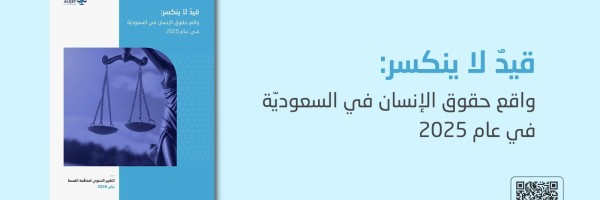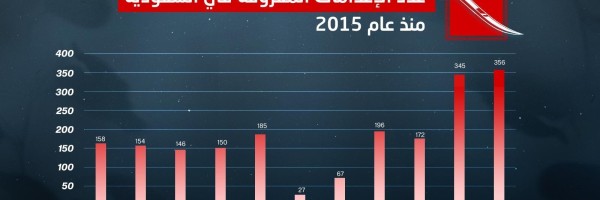Prisoners of conscience in Saudi Arabia are continuing to be arbitrarily detained even after their prison sentences expire, signalling another worrying trend as the human rights situation in the kingdom deteriorates still further.
Human rights defender Mohammed al-Rabiah remains in detention despite completing his prison sentence several days ago. Al-Rabiah was arrested on 15 May 2018, during a spate of arrests of women human rights defenders including Loujain al-Hathloul and Aziza al-Yousef, and was sentenced in 20 April 2021 by the Specialised Criminal Court (SCC) to six and a half years in prison, with two years suspended, on charges relating to his peaceful activism and defence of women’s rights. Prison terms in Saudi Arabia are based on the Islamic Hijri calendar, in which a year is approximately 11 days shorter than in the Gregorian calendar. Al-Rabiah’s sentence thus expired on 28 September 2022, yet he remains in jail. He has also been subjected to brutal torture in detention.
Other prisoners of conscience continue to be held months after the end of their sentences. Former Palestinian official Mohammed al-Khudari remains detained in Saudi Arabia, in life-threatening conditions, despite his unjust prison sentence having expired in February 2022. Al-Khudari, arrested in April 2019, was sentenced in 2021 to 15 years in prison, reduced on appeal to six years with half the term suspended, in a mass trial marred by serious due process violations. Al-Khudari is critically ill with cancer, yet the authorities have persistently denied him essential medical treatment. Likewise, journalist Ahmad al-Sawian, arrested in September 2017 during a crackdown on dissent, has completed a three-year sentence based on charges relating to free speech yet he remains behind bars.
In some cases the Saudi authorities have actually increased the sentences of those already serving prison terms or expecting to be released. Khaled al-Odah, arrested in September 2017 after tweeting about his brother, Islamic cleric Salman al-Odah, recently had his initial five-year sentence, which would have expired in July 2022, increased. Similarly, blogger Abdulaziz Al-Odah, arrested in September 2019 after publishing comments on his Twitter account, had his five-year sentence (half suspended) increased. And last year the Court of Appeal increased the jail sentence passed on human rights activist Khaled al-Omair from seven years to nine.
Some prisoners of conscience detained long beyond their sentences have subsequently been released, though often on stringent conditions such as arbitrary bans on travel, work and social media activity. For example, on 22 August 2022 Palestinian poet and artist Ashraf Fayadh was released from jail more than 10 months after his unjust sentence expired in early October 2021. Fayadh was detained in Saudi Arabia on 1 January 2014 and sentenced to death for some poems he had published; this sentence was later commuted to an eight-year prison term.
Again, on 3 February this year human rights activist Fahad al-Fahad and journalist Fahad al-Suneidi were released from prison approximately one year after their prison sentences had ended. Al-Fahad had been arrested on 7 April 2016 and sentenced to five years in prison and a 10-year travel ban on charges relating to his civic activism, and al-Suneidi, arrested on 11 September 2017, had been sentenced to three and a half years on charges relating to free speech.
This is not a new phenomenon in Saudi Arabia, even though holding prisoners beyond the expiry of their prison terms violates even the kingdom’s own domestic legislation: Article 2 of the Law of Criminal Procedure (LCP) outlaws the practice. Sometimes, however, prisoners are arbitrarily classified as “deviants” or “terrorists” and held for further periods for “counselling” before release, in the Mohammed bin Nayef Counselling and Care Centre created for that purpose.
Yet this abusive practice seems to be worsening in recent months, along with an unprecedented slew of lengthy sentences handed down in the Saudi courts, as the human rights situation in the country deteriorates once again. This follows swiftly on the heels of the recent diplomatic rehabilitation of Crown Prince and de facto ruler Mohammed bin Salman, who had been largely shunned by world leaders since the state-sponsored murder of journalist Jamal Khashoggi in 2018.
ALQST’s Head of Monitoring and Communication, Lina Alhathloul, comments: "This is yet another example of the cruelty of the Saudi authorities. Even after completing their unjust sentences, imposed following sham trials, prisoners continue to be arbitrarily held, or even re-sentenced, in violation of both domestic law and the most basic international human rights standards."
ALQST calls on the Saudi authorities to put an end to these arbitrary practices, and to immediately and unconditionally release all those detained beyond completion of their prison sentences, as well as all prisoners of conscience detained for peacefully exercising their fundamental rights.




